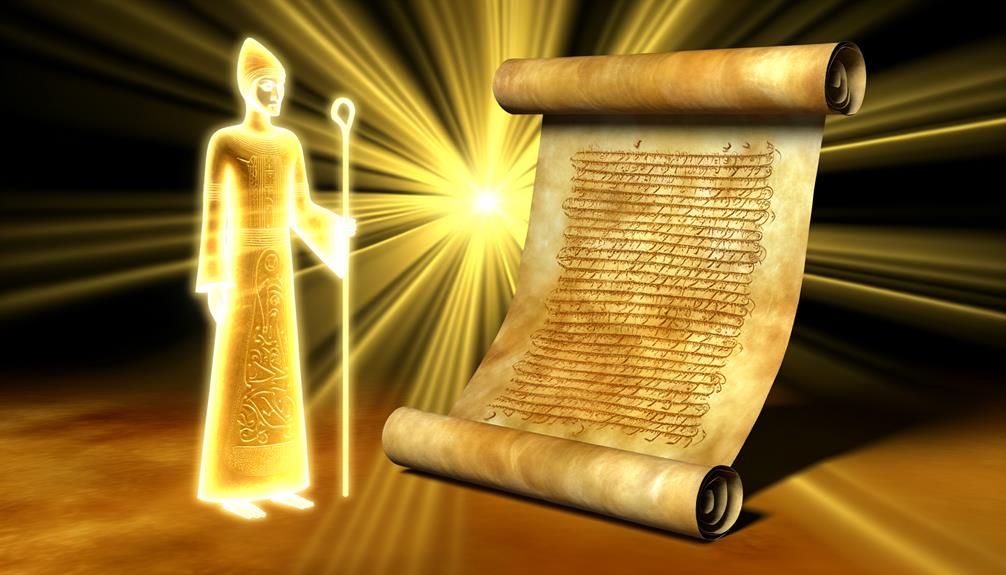Meaning of the Name Joachim
The name Joachim originates from the Hebrew Yehoyaqim, meaning 'raised by Yahweh' or 'established by God.' This etymological composition combines 'Yeho,' referring to Yahweh, and 'yaqim,' meaning to establish. Historically, Joachim appears in biblical contexts as the father of the Virgin Mary in apocryphal texts, emphasizing piety and divine favor.
His reverence throughout medieval times profoundly influenced art and culture. The name has various linguistic adaptations across cultures, maintaining its profound spiritual and historical essence.
For those keen on further exploring, the name Joachim offers a rich tapestry of religious, cultural, and literary significance.

Key Takeaways
- Joachim means 'raised by Yahweh' or 'established by God,' originating from the Hebrew name Yehoyaqim.
- In Christian tradition, Joachim is venerated as the father of the Virgin Mary, emphasizing piety and devotion.
- The name has significant cultural and religious impact, especially in Judeo-Christian contexts, influencing art and ceremonies.
- Joachim has linguistic variations across Hebrew, Greek, Latin, German, and Spanish, reflecting its historical journey.
- Famous bearers like Saint Joachim and Joachim Raff contribute to the name's enduring legacy and significance.
Etymology and Origin
The name Joachim originates from the Hebrew name Yehoyaqim, which translates to 'raised by Yahweh' or 'established by God,' reflecting its deep-seated significance in religious and historical contexts.
This etymological foundation situates Joachim within the Semitic linguistic tradition, emphasizing its theological resonance. The name is a compound of two elements: 'Yeho,' a theophoric prefix denoting Yahweh, and 'yaqim,' meaning to establish or raise. The construction of the name hence encapsulates a divine endorsement or blessing, conveying a sense of divine ordination and strength.
Historically, the name has traversed various cultures and languages, including Greek (Ioakeim) and Latin (Joachim), preserving its core meaning while adapting to phonetic and orthographic norms across different societies.
Biblical References
The name Joachim is imbued with significant biblical references, appearing in both the Old and New Scriptures. In the Old Scriptures, the name is linked to notable figures such as Jehoiakim, a king of Judah. In the New Scriptures, it is traditionally associated with the father of the Virgin Mary.
Scriptural interpretations of the name Joachim highlight its meaning, 'established by God,' reflecting its theological and historical importance.
Old Testament Mentions
Although the name Joachim is not directly mentioned in the Old Scriptures, its Hebrew equivalent, Jehoiakim, appears in several significant narratives, particularly within the books of Kings and Chronicles.
Jehoiakim, originally named Eliakim, was appointed as king of Judah by Pharaoh Necho II, succeeding his brother Jehoahaz. His reign is detailed in 2 Kings 23:34-24:6 and 2 Chronicles 36:4-8, which describe his subjugation by the Babylonian King Nebuchadnezzar II, marking a pivotal period in Judah's history.
Jehoiakim's reign is often characterized by political upheaval and moral decline, leading to substantial historical and theological implications. These accounts underscore the name's deep-rooted significance within the biblical narrative, providing insight into its historical and spiritual dimensions.
New Testament Connections
While the Old Record provides a historical backdrop for the name through Jehoiakim, the New Record introduces Joachim in a different context, primarily through apocryphal texts such as the Gospel of James, where he is identified as the father of the Virgin Mary.
This association situates Joachim within the genealogical framework of Christianity's central narrative. Additionally, his portrayal in apocryphal literature highlights his piety and devotion, which contributed to the sanctity attributed to Mary, and by extension, Jesus.
The New Scripture itself does not explicitly mention Joachim, but the reverence accorded to him in later Christian traditions underscores his symbolic importance. Ergo, Joachim's role, though not canonical, is integral to the broader theological tapestry of early Christian thought.
Name Interpretations Scripture
Scriptural interpretations of the name Joachim often draw from its Hebrew origins, where it is rendered as 'Yehoyaqim,' meaning 'raised by Yahweh' or 'established by God.'
In the Old Covenant, Jehoiakim, a variant of Joachim, is a significant figure, serving as the King of Judah (2 Kings 23:34-24:6). This king's reign, marked by political turmoil and prophetic denunciations, underscores the divine implications of his name.
Additionally, in the deuterocanonical books, Joachim is noted as the father of the Virgin Mary, emphasizing his role in divine providence (Protoevangelium of James).
These scriptural references illuminate the depth of the name's meaning, highlighting notions of divine elevation and establishment within a theological context.
Historical Significance
The name Joachim holds considerable historical significance, stemming from its prominent biblical references, such as its association with the father of the Virgin Mary.
During the medieval period, the name experienced a resurgence, influenced by its inclusion in religious texts and the veneration of saints.
In contemporary times, modern interpretations continue to reflect its enduring legacy and cultural resonance.
Biblical References
Joachim, a name of Hebrew origin meaning 'God has established,' holds significant historical and theological importance within various biblical texts. In Christian tradition, Joachim is revered as the father of the Virgin Mary, making him the maternal grandfather of Jesus Christ. His story is primarily found in apocryphal texts such as the Protoevangelium of James, which provides a detailed narrative of Joachim's life and virtues.
Additionally, the name Joachim is linked to various figures in the Old Testament, including Jehoiakim, the king of Judah, whose rule is chronicled in the Books of Kings and Chronicles. These references underscore the name's enduring significance in biblical history and its profound theological implications within the Judeo-Christian tradition.
Medieval Influence
Throughout the medieval period, the veneration of Saint Joachim greatly influenced religious art, liturgy, and the broader cultural landscape of Christendom. His depiction in illuminated manuscripts, frescoes, and altarpieces underscored his revered status as the father of the Virgin Mary.
The proliferation of churches and chapels dedicated to Saint Joachim reflected his significance within the ecclesiastical hierarchy. Liturgical texts and feast days commemorated his role, enhancing his presence in the spiritual life of medieval communities. Additionally, his story was woven into the fabric of medieval hagiography, where he was portrayed as a paragon of piety and faith.
This veneration not only reinforced theological themes but also provided a model of virtue for the laity to emulate.
Modern Interpretations
Examining Joachim's historical significance through modern interpretations reveals a nuanced understanding of his enduring legacy in both religious and cultural contexts.
In contemporary theology, Joachim is frequently revisited as the father of the Virgin Mary, playing a pivotal role in the genealogies of Christian doctrine. Scholarly discourse often highlights his representation as an archetype of piety and divine favor, underscoring his contributions to biblical narratives.
Culturally, Joachim's name persists in various forms, symbolizing steadfastness and divine blessing. Modern literary and artistic works occasionally draw upon his story, reflecting enduring reverence and symbolic richness.
Such interpretations illuminate the multifaceted legacy of Joachim, demonstrating how his historical significance continues to resonate over time.
Cultural Impact
In various cultures throughout history, the name Joachim has held significant religious and historical connotations, influencing literature, art, and societal traditions.
In Judeo-Christian contexts, Joachim is traditionally recognized as the father of the Virgin Mary, imbuing the name with profound spiritual significance. Medieval and Renaissance artworks frequently depict him, reinforcing his venerated status.
Literary works also reference Joachim, often highlighting themes of faith and moral integrity. The name appears in religious texts and hagiographies, underscoring its enduring influence.
Additionally, Joachim has permeated cultural rituals, with various communities celebrating saints' feasts and naming ceremonies in his honor.
Therefore, Joachim's cultural impact is multifaceted, reflecting its deep-rooted presence in historical and contemporary societal frameworks.
Linguistic Variations
The name Joachim, with its rich cultural heritage, exhibits a fascinating array of linguistic variations across different languages and regions.
In Hebrew, it appears as יוֹיָקִים (Yoyakim), reflecting its biblical origins.
The Greek version, Ἰωακείμ (Iōakeím), closely mirrors the original, while the Latin form is Ioachim.
In German-speaking regions, it is commonly rendered as Joachim, maintaining phonetic fidelity.
Spanish and Portuguese variations include Joaquín and Joaquim, respectively, illustrating subtle regional adaptations.
The French variant, Joachim, aligns closely with the German form, though pronounced differently.
Each linguistic variation retains the name's fundamental essence, yet adapts phonetically and orthographically to fit local linguistic contexts, underscoring its widespread and enduring appeal.
Modern Usage
Today, the name Joachim continues to be embraced globally, often chosen for its historical significance and timeless appeal. In contemporary settings, Joachim is seen in diverse cultures, maintaining its resonance through its biblical roots and noble connotations.
The name retains popularity in European countries such as Germany, France, and Spain, where it is appreciated for its classical elegance. Additionally, its adaptability to various linguistic forms, such as Joaquín in Spanish-speaking regions, further enhances its widespread use.
The name's meaning, 'established by God,' continues to hold profound spiritual and cultural implications, making it a favored choice among parents seeking a name with depth and heritage. Therefore, Joachim's modern usage reflects a blend of tradition and enduring relevance.
Famous Bearers
Renowned figures bearing the name Joachim have left significant marks across various fields, from religious history to contemporary arts and sciences.
In religious contexts, Saint Joachim, traditionally recognized as the father of the Virgin Mary, holds a venerable place in Christian hagiography.
In the domain of music, Joachim Raff, a 19th-century Swiss composer, made substantial contributions to classical music.
Additionally, Joachim von Ribbentrop, albeit controversial, was a prominent figure in 20th-century politics as Nazi Germany's Foreign Minister.
Contemporary culture celebrates Joachim Trier, a Norwegian filmmaker acclaimed for his thought-provoking cinema.
Each of these individuals, through diverse areas, enriches the legacy of the name Joachim, illustrating its historical and ongoing significance across various spheres of human achievement.
Conclusion
The name Joachim, with its rich etymology and profound biblical roots, has traversed centuries to maintain cultural and historical significance.
Linguistically diverse, its variations span multiple languages, reflecting its global resonance.
A 2021 study indicated that the name Joachim ranks among the top 500 names in Germany, emphasizing its enduring popularity.
Through its biblical associations and distinguished bearers, the name continues to be a symbol of reverence and tradition in contemporary society.






